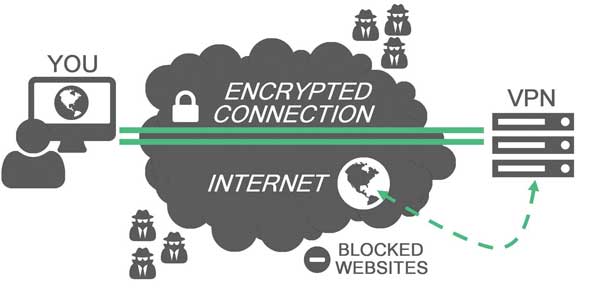The Technology and Its Capabilities
VPNs have rapidly grown in popularity lately as a way to ensure online privacy and to secure the Internet traffic of their users. Nowadays, almost anyone who browses online regularly knows at least something about VPNs or has heard about the term. You can visit bestvpnrating.com to find out more about the technology, usage scenarios and to examine and compare the features offered by a series of top VPN providers.
What a VPN does is establish secure communication channels with the internet in which the entire traffic is reliably encrypted. This makes interception and decryption nearly impossible, hiding the content of the traffic from the ISP but also from hackers or a potential intrusion. All this data traffic is routed through one of the many dedicated VPN servers belonging to the provider. The user’s physical IP address online is replaced with the IP address of the VPN server, effectively hiding his or her online identity.

The Utility for Customer Support Managers and Agents
Below are some reasons why understanding this technology is useful from a customer support perspective:
First, VPNs are important for safe practices involving online transmission of business or personal data while at the workplace, be it transmission of important data to a superior (for instance, financial), or chatting about sensitive issues with the family (we are all humans after all). It is important that the customer support agent is instructed to safely process all this data – after all, ransomware attacks are not a rarity nowadays.
Second, customer support agents should be instructed that due to VPNs there is always the possibility that an Internet call might come from a different country than that shown in the system. This is because VPN servers through which the information is routed can be located in any given country making the user appear as a resident of the respective country.
Third, agents should advise customers to enable a VPN connection if sensitive data is to be transmitted online (like financial information or important personal data). This is especially important if the client is calling or sending data from a public network. Not only will these actions serve as additional security measures, they will also demonstrate to the clients the high safety practices that are undertaken by customer support agents in their interest.
On the other hand, VPNs can be an obstructing issue in some cases. Thus, platforms like PayPal and many banks explicitly advice against the use of the technology while logging into their platform and even ban users for doing so (fortunately VPNs can be disabled temporarily). When helping clients handle financial transactions, a customer support agent must be keenly aware of the problem and be able to advise his/her customers appropriately.

Knowing about VPNs will ensure customer support agents are not caught by surprise in the above scenarios or in other ones that were not covered here.
About the author
 Dainan Gilmore is an enthusiastic expert in cybersecurity and works as a Cryptanalyst for the Bestvpnrating.com.
Dainan Gilmore is an enthusiastic expert in cybersecurity and works as a Cryptanalyst for the Bestvpnrating.com.




